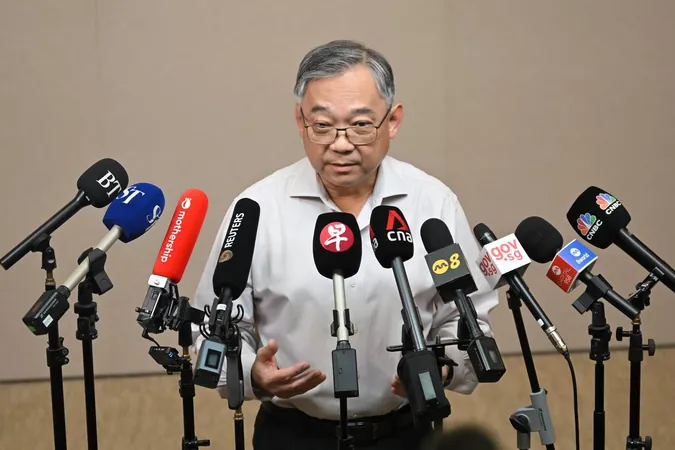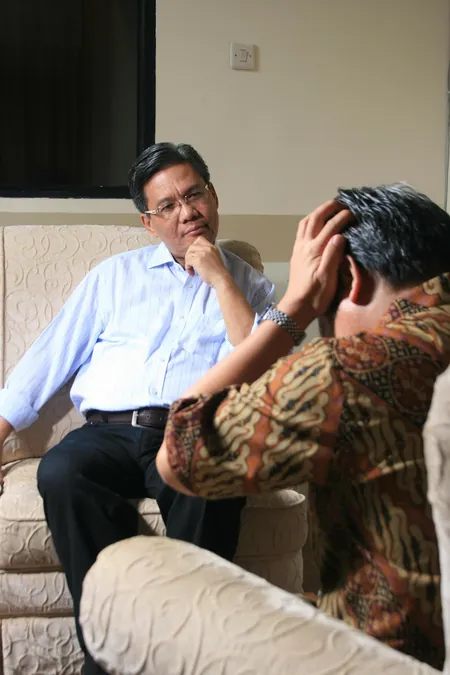
Singapore Expresses Disappointment Over US Tariffs, Aims for Dialogue with Washington
2025-04-03
Author: Mei
Singapore's Disappointment Regarding US Tariffs
In a recent statement, Singapore's Deputy Prime Minister Gan Kim Yong articulated the nation's disappointment regarding the U.S. government's decision to impose a 10% tariff on goods imported from Singapore. This move is particularly surprising in light of the longstanding economic partnership between the two nations, highlighted by their free trade agreement (FTA) that has fostered robust trade ties.
Mutual Benefits of the US-Singapore FTA
DPM Gan emphasized the mutual benefits of the US-Singapore FTA, noting that U.S. imports into Singapore have enjoyed zero tariffs for over 20 years, resulting in a notable trade surplus of approximately $30 billion for the U.S. “Given this history, it is disheartening to see such a measure taken against Singapore,” he remarked.
Engaging in Dialogue
To address these tariffs, Singapore plans to engage in discussions with American officials to gain clarity on the calculations behind the tariffs and rectify any misunderstandings that might have led to this decision. Despite having the option to pursue countermeasures and dispute resolution since the FTA provides that recourse, Singapore is opting for dialogue rather than retaliation. DPM Gan underlined that imposing retaliatory duties would escalate costs for consumers and businesses in Singapore, ultimately harming the economy.
Concerns of Global Trade Conflict
The additional tariffs come amidst concerns from analysts who fear that these moves could spark a wider global trade conflict, jeopardizing economic growth. DPM Gan acknowledged the seriousness of the situation, stating, 'The announced tariffs could significantly impact our economy, and we must prepare our households and businesses for potential challenges ahead.'
Reassessing Economic Growth Forecasts
In response to these developments, Singapore is also reassessing its economic growth forecasts for 2025. DPM Gan indicated that the nation is ready to provide support if needed, reiterating that it is still early to determine the full scope of the economic impact. He warned that if global economic activity slows due to these tariffs, even Singapore, with its relatively lower tariff rate compared to other nations, will feel the pinch.
Threat of a Global Trade War
The Deputy Prime Minister also noted the alarming trend of retaliatory tariffs being announced by other countries. 'If such escalatory measures persist, we could face a full-blown global trade war,' he cautioned, adding that ramifications could include disrupted supply chains and eroded consumer confidence, compounding challenges for the global economy and influencing Singapore’s medium to long-term economic outlook.
Engagement with Other Trade Partners
Moreover, to mitigate possible fallout, Singapore will actively engage other trade partners, particularly within the ASEAN community, to explore collaborative measures that can sustain economic momentum. He stated, 'ASEAN serves as a vital platform where we can collectively strategize on deepening our economic integration.'
Commitment to Multilateral Trading System
Additionally, Singapore remains committed to supporting the multilateral trading system through collaboration with likeminded countries to bolster the World Trade Organization. DPM Gan stressed the importance of a rules-based international trade framework, asserting that maintaining a stable multilateral system is essential for global economic cooperation.
Navigating the Challenges ahead
As Singapore navigates this challenging landscape, the focus remains on constructive engagement and collaboration to overcome the hurdles posed by rising tariffs and potential retaliatory measures on the global stage.




 Brasil (PT)
Brasil (PT)
 Canada (EN)
Canada (EN)
 Chile (ES)
Chile (ES)
 Česko (CS)
Česko (CS)
 대한민국 (KO)
대한민국 (KO)
 España (ES)
España (ES)
 France (FR)
France (FR)
 Hong Kong (EN)
Hong Kong (EN)
 Italia (IT)
Italia (IT)
 日本 (JA)
日本 (JA)
 Magyarország (HU)
Magyarország (HU)
 Norge (NO)
Norge (NO)
 Polska (PL)
Polska (PL)
 Schweiz (DE)
Schweiz (DE)
 Singapore (EN)
Singapore (EN)
 Sverige (SV)
Sverige (SV)
 Suomi (FI)
Suomi (FI)
 Türkiye (TR)
Türkiye (TR)
 الإمارات العربية المتحدة (AR)
الإمارات العربية المتحدة (AR)